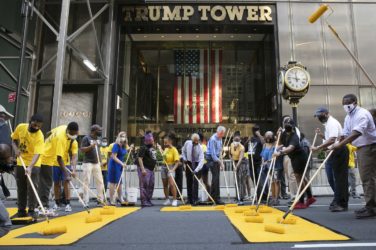 Featured – How Black Lives Matter Could Reshape the 2020 Elections. By Charlotte Alter / Time
Featured – How Black Lives Matter Could Reshape the 2020 Elections. By Charlotte Alter / Time
The last few weeks have illustrated the power of the rising racial-justice movement in the wake of Floyd’s death. In less than a month, the protests have shifted public opinion on systemic racism, toppled high-profile executives and gathered momentum in their quest to defund police departments. The next few weeks and months will test whether the movement can translate its social and cultural might into political power. New York Mayor De Blasio joins protesters in painting giant ‘Black Lives Matter’ mural in front of Trump Tower. Read more
Related: Black Lives Matter is 7 years old. It’s already changed the country forever. You Tube
Related: Yes, even in small, single-stoplight towns they’re saying his name. By Petula Dvorak / Wash Post
 First Comes Police Reform. Then Comes Everything Else. By Adam Harris / The Atlantic
First Comes Police Reform. Then Comes Everything Else. By Adam Harris / The Atlantic
People protest to signal that they are fed up with the status quo. But protest is rarely singularly focused. People are in the streets this summer over the murder of George Floyd, but the current racial reckoning in America goes far beyond lethal policing. People are in the streets because Black students are five times more likely than white students to attend highly segregated schools. Because Black unemployment is regularly twice the white unemployment rate. Because racist housing policies have locked Black families into unequal neighborhoods and out of the prospect of building wealth. Read more
 Trump Snaps ‘So Are White People’ When Asked Why Black People Are Killed By Cops. By David Moye / HuffPost
Trump Snaps ‘So Are White People’ When Asked Why Black People Are Killed By Cops. By David Moye / HuffPost
A 2016 Washington Post story notes white people make up about 49% of those who are killed by police officers, while Black Americans account for 24% of those fatally shot and killed by the police. However, since Black people make up just 13% of the U.S. population, that means they are 2.5 times as likely as white Americans to be shot and killed by police officers. Read more
Related: In a pair of interviews, Trump highlights white victimhood. By Philip Bump / Wash Post
Related: American Horror, Starring Donald Trump. By Charles M. Blow / NYT
 Pandemic, Protests Cause Racism to Resonate as a Public Health Issue. By Joseph P. Williams / US News
Pandemic, Protests Cause Racism to Resonate as a Public Health Issue. By Joseph P. Williams / US News
SPURRED BY WEEKS OF street protests sparked by the killing of George Floyd – and amid the fast-moving, potentially deadly coronavirus pandemic that has ravaged Black and Hispanic communities – officials across the country are calling out racism as a public health crisis. In Wisconsin, for example, Gov. Tony Evers last month declared that “inaction, indifference and institutional racism has harmed generations of black and brown Wisconsinites.” In Maryland, the Montgomery County Council followed suit, adopting a resolution stating that racism – “a root cause of disparities and inequities” – is a public health problem warranting action. Read more
Related: How to explain systemic racism to non-liberals like me. By Megan McArdle / Wash Post
Related: ‘White Fragility’ Is Everywhere. But Does Anti-Bias Training Work? By Daniel Bergner / NYT
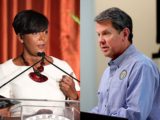 Georgia’s Republican governor rejects coronavirus restrictions Atlanta mayor put in place amid surge. By Roger Sollengerger / Salon
Georgia’s Republican governor rejects coronavirus restrictions Atlanta mayor put in place amid surge. By Roger Sollengerger / Salon
The office of Georgia Republican Gov. Brian Kemp released a statement Monday instructing Atlanta residents to ignore “confusing” new restrictions put in place over the weekend by Mayor Keisha Lance Bottoms amid record-high COVID-19 infections in the city and across the state. Citing Kemp’s “reckless” reopening, Bottoms, who recently tested positive for COVID-19, had directed the city to return to Phase 1, or the most restrictive measures. Read more
 Jeff Sessions Ends His Political Career in a Blaze of Racism. By Pema levy / Mother Jones
Jeff Sessions Ends His Political Career in a Blaze of Racism. By Pema levy / Mother Jones
Racism defined Sessions’ entire career, but racism is not what ended it. In fact, it was Trump’s patronage that put Sessions and the white grievance he long embodied at the center of American politics. Sessions’ political career is over now because he realized too late that Trumpism isn’t just about the worldview; it’s also about Trump himself, a cult of loyalty that Sessions ran afoul of before it was clear how easily Trump cast people aside. Read more
 University of Mississippi removes Confederate statue from heart of campus. By Phil McCausland / NBC News
University of Mississippi removes Confederate statue from heart of campus. By Phil McCausland / NBC News
The University of Mississippi began taking down a 30-foot Confederate statue Tuesday, more than a year after students, faculty and staff elected to remove the monument from the heart of the school’s campus. Read more
 Seeing Native Americans Nowhere, and Everywhere. By Jennifer Schussler / NYT
Seeing Native Americans Nowhere, and Everywhere. By Jennifer Schussler / NYT
As Washington’s professional football team retires a team name, a curator at the National Museum of the American Indian talks about our attachment to Native American imagery. “It’s spooky, weird and subversive,” Paul Chaat Smith, a curator who created the exhibition with Cécile R. Ganteaume, said of the profusion of Native imagery. “We wanted to make the point that this is part of American life, going back 300 years, since before the founding,” he said. “From Paul Revere to Kanye West, why does this never go out of style?” Read more
Related: The Texas Rangers’ team name must go. By Karen Attiah / Wash Post
 In historic move, North Carolina city approves reparations for Black residents. By Joel Burgess / USA Today
In historic move, North Carolina city approves reparations for Black residents. By Joel Burgess / USA Today
In an extraordinary move, the Asheville City Council has apologized for the North Carolina city’s historic role in slavery, discrimination and denial of basic liberties to Black residents and voted to provide reparations to them and their descendants. The 7-0 vote came the night of July 14. “Hundreds of years of Black blood spilled that basically fills the cup we drink from today,” said Councilman Keith Young, one of two African American members of the body and the measure’s chief proponent. “It is simply not enough to remove statutes. Black people in this country are dealing with issues that are systemic in nature.” Read more
 Black deaths matter: The centuries-old struggle to memorialize slaves and victims of racism. By Vicki Daniel / The Conversation
Black deaths matter: The centuries-old struggle to memorialize slaves and victims of racism. By Vicki Daniel / The Conversation
The fight to remember those killed by violence has roots in the history of slave cemeteries and burial practices. The enslaved were often limited in their choice of burial grounds, especially on rural Southern plantations. White owners relegated their cemeteries to marginal land that could not be cultivated. Many burials were marked only with a wooden post. Read more
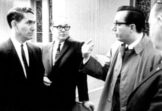 Revisiting “A Time for Burning” and the Spiritual Crisis of Racism. By Richard Brody / The New Yorker
Revisiting “A Time for Burning” and the Spiritual Crisis of Racism. By Richard Brody / The New Yorker
The film, shot in 1965, is centered on William Youngdahl, the minister of Augustana Lutheran Church, in Omaha, Nebraska, which has an all-white congregation. Youngdahl seeks to facilitate contact between his congregation and local Black churchgoers. He invites teen-agers from the nearby, all-black Calvin Memorial Presbyterian Church to join one of his services. Read more
 CBS, once broadcast’s whitest network, sets an ambitious goal for inclusive hiring. By Melanie McFarland / Salon
CBS, once broadcast’s whitest network, sets an ambitious goal for inclusive hiring. By Melanie McFarland / Salon
The flurry of Black Lives Matter statements from Hollywood studios, networks and media conglomerates has attracted criticism from people within and outside the industry pointing to the dismal track record many of these companies have with regard to honestly valuing inclusion. Audiences can see the lack of diversity in front of the camera for themselves, but it doesn’t take much digging to discover an overall lack of people of color in decision-making positions behind the camera, whether on set or in executive offices. Among the major networks CBS has long been perceived as a top offender in this regard. But on Monday morning the network publicly stated its commitment to changing that image. Read more
 The Revolutionary Life of Paul Robeson: Scholar Gerald Horne on the Great Antifascist Singer, Artist and Rebel. By Jeremy Scahell / The Intercept Podcast
The Revolutionary Life of Paul Robeson: Scholar Gerald Horne on the Great Antifascist Singer, Artist and Rebel. By Jeremy Scahell / The Intercept Podcast
This week on Intercepted: As Trump vows to smash leftist movements, we take a comprehensive look at the life of the revolutionary Black socialist, anti-fascist, and artist Paul Robeson. University of Houston historian Gerald Horne, author of “Paul Robeson: The Artist as Revolutionary,” discusses Robeson’s life from his early years to his time in Europe on the brink of a fascist war. The son of an escaped slave, Robeson rose to international fame as a singer and actor, but committed himself to the liberation of oppressed people across the globe and was a tenacious fighter for the freedom of Black people in the U.S. Read and Listen here
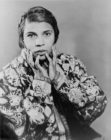 When Marian Anderson Defied the Nazis. By Kira Thurman / The New Yorker
When Marian Anderson Defied the Nazis. By Kira Thurman / The New Yorker
If Americans know one fact about the legendary African-American contralto Marian Anderson, it’s that she sang in defiance on the steps of the Lincoln Memorial, in 1939. But that performance was not Anderson’s first time confronting anti-Black racism in such a spectacular manner that she made international news. Throughout the nineteen-thirties, Anderson stared down opposition in Nazi Germany and Fascist Austria. Read more
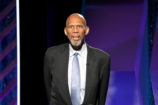 Kareem Abdul-Jabbar Addresses Anti-Semitism in Sports and Hollywood. By Althea Legaspi / Rolling Stone
Kareem Abdul-Jabbar Addresses Anti-Semitism in Sports and Hollywood. By Althea Legaspi / Rolling Stone
NBA legend Kareem Abdul-Jabbar addressed anti-Semitism in the sports world and Hollywood in a new column for The Hollywood Reporter. In his piece, he questioned why in the midst of the Black Lives Matters movement, there has not appeared to be much outrage against anti-Semitic messages that several prominent celebrities have shared online. Instead, running contrary to social justice, he described the response to anti-Semitism as “meh-rage.” Read more
Related: The Anti-Semitism We Didn’t See. By Jemele Hill / The Atlantic
 How Simone Biles found her voice and changed gymnastics culture. By Bonnie D. Ford and Alyssa Roenigk / ESPN
How Simone Biles found her voice and changed gymnastics culture. By Bonnie D. Ford and Alyssa Roenigk / ESPN
From the time Biles began training in Houston with her longtime coach, Aimee Boorman, as an 8-year-old, she and her family took a different path. Biles’ story is proof that, contrary to the Karolyis’ dictates, there is another way to win. Now, in partnership with the 30 for 30 podcast “Heavy Medals: Inside the Karolyi Gymnastics Empire,” we present an oral history of how Biles’ unique journey to becoming the world’s greatest gymnast helped her claim her power, find her voice and change the sport. Read more
Related: Simone Biles talks candidly about effects of abuse in Vogue interview. By Nancy Armour / USA Today
 Tina Turner comes out of retirement with a remix of ‘What’s Love Got To Do With It?’ By Marianne Garvey / CNN
Tina Turner comes out of retirement with a remix of ‘What’s Love Got To Do With It?’ By Marianne Garvey / CNN
Tina Turner is back with a remix of her classic hit, “What’s Love Got To Do With It?” Turner worked with Norwegian producer DJ Kygo on a remix of the song. Kygo last year made a remix of Whitney Houston’s cover of “Higher Love,” which hit the Billboard Hot 100 chart. Kygo announced the news on Instagram, including a picture of himself with Turner, writing that the song will be available on Friday. Read more
Visit our home page for more articles, book/podcast and video favorites. And at the top of this page register your email to receive notification of new editions of Race Inquiry Digest. Click here for earlier Digests.
Use the buttons below to share the Digest in an email, or post to your Facebook, Linkedin or Twitter accounts.